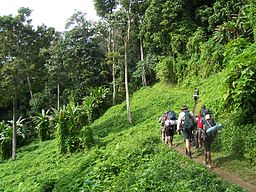 It seems so silly; who doesn’t know that you’re a person?
It seems so silly; who doesn’t know that you’re a person?
You might not guess the answer.
In a recent article called “Last of the Cave People,” National Geographic writer Mark Jenkins related his experience following the Meakambut, “one of the last cave-dwelling, seminomadic peoples in Papua New Guinea.” With him was Sebastian Haraha, an ethnographer whose purpose on the journey is described by Jenkins as:
To pinpoint the exact locations of the Meakambut’s caves with a global positioning system. He hopes to register them under the National Cultural Property Act, so the homeland of the Meakambut will be protected from logging and mining.
Noble work! Then after witnessing the Meakambut men and women struggle for survival without much help, Haraha becomes disillusioned with his efforts. Jenkins writes:
He was compelled to temporarily abandon his plan of mapping the Meakambut’s caves—the goal of which is to save their habitat, and thus ensure the continuation of their culture in the future—in order to save their lives in the present. He says the choice was clear. He is a human first, an ethnographer second.
“Protecting the caves? What does it matter—if there are no Meakambut left?” asks Sebastian.
Haraha invokes his humanity first, and his professional role second. Which may be more profound than we realize.